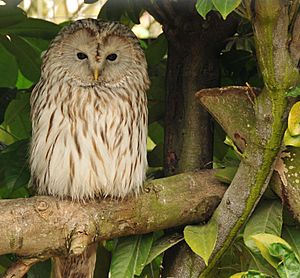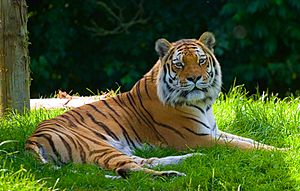Banham Zoo facts for kids
 |
|
| Date opened | 1968 |
|---|---|
| Location | Banham, Norfolk, England |
| Land area | 50 acres (20 ha) |
| Coordinates | 52°26′41″N 1°1′30″E / 52.44472°N 1.02500°E |
| No. of animals | 2000+ |
| No. of species | 100 |
| Annual visitors | 200,000 |
| Memberships | BIAZA, EAZA, WAZA |
Banham Zoo is a fun zoo located in Banham, Norfolk, England. It covers about 50-acre (20 ha) of land. Today, over 2,000 amazing animals call Banham Zoo their home!
The zoo first opened its doors in 1968. In 2013, it became a charity. Many groups have called it Norfolk's Top Attraction. More than 200,000 people visit the zoo each year.
Banham Zoo is part of the Zoological Society of East Anglia. This charity also owns Africa Alive!, another wildlife park in Suffolk.
Contents
Discover the History of Banham Zoo
Banham Zoo started small, with a collection of pheasants and parrots. It first welcomed visitors in 1968.
In 1971, the zoo got a group of woolly monkeys. It was then known as the "Banham Zoo and Woolly Monkey Sanctuary." Over the years, the zoo has grown a lot. It now has many more animals. But it still has one of the best collections of smaller monkeys in Europe!
Meet the Animals at Banham Zoo
Banham Zoo is home to over 2,000 animals from around the world. You can see many different types of creatures here.
Amazing Birds at the Zoo
The zoo has a wide variety of birds. You can spot tall emus and colorful Chilean flamingos. Look out for playful black-footed penguins.
Other birds include sun conures and blue-and-yellow macaws. You might also see black kites and red-crested turacos. Don't miss the laughing kookaburras and snowy owls!
Playful Primates and Monkeys
The zoo has many different kinds of primates. These include siamangs and Colombian spider monkeys. You can also see black-and-white ruffed lemurs and ring-tailed lemurs.
Tiny pygmy marmosets and cotton-top tamarins live here too. Other primates include Goeldi's monkeys and golden lion tamarins. Look for the unique white-faced sakis and emperor tamarins.
Other Fantastic Mammals
Beyond primates, the zoo has many other mammals. You can see red kangaroos and tall giraffes. There are also powerful Sri Lankan leopards and Siberian tigers.
Other cool mammals include red pandas and slender-tailed meerkats. You might also spot Grevy's zebras and cheetahs. Don't forget the cute kunekune pigs and fluffy llamas!
Reptiles and Creepy Crawlies
The zoo also has a section for reptiles and invertebrates. You can see royal pythons and rainbow boas. There are also bearded dragons and leopard geckos.
For those who like bugs, you might find Madagascan hissing cockroaches. There are also Mexican redknee tarantulas and giant African land snails.
Explore the Exhibits at Banham Zoo
The zoo has special areas designed for its animals. These exhibits make the animals feel at home. They also help visitors learn more about them.
The Province of the Snow Cat
This exhibit opened in 2009. It is home to the zoo's snow leopards. The area looks like a rocky mountain with a small stream. In 2010, three snow leopard cubs were born here!
The Giraffe House
The Giraffe House was built in 2008. It was a special way to celebrate the zoo's 40th birthday. Since it opened, several baby giraffes have been born here.
The Bird Garden
The Bird Garden is a lovely walking path. It has many aviaries (large bird enclosures). You can see different birds and smaller monkeys here. Some birds include Von der Decken's hornbills and Swainson's lorikeets. You might also see Geoffroy's marmosets.
Lemur Encounters
Opened in late 2011, Lemur Encounters is a large, open area. Visitors can walk through this exhibit. You can see red ruffed and ring-tailed lemurs roaming freely. It's a great chance to see these amazing animals up close!
 | Lonnie Johnson |
 | Granville Woods |
 | Lewis Howard Latimer |
 | James West |



